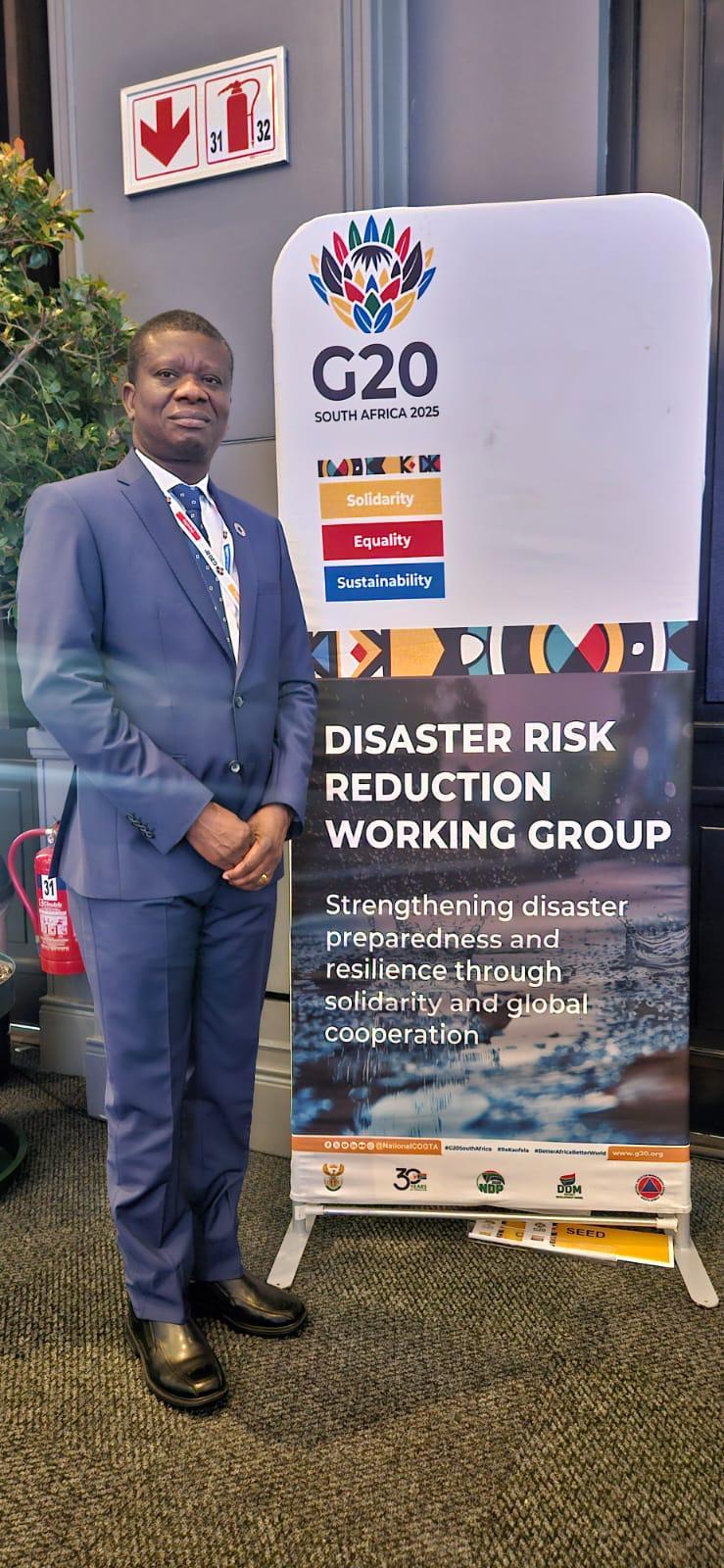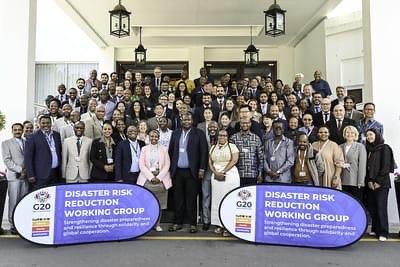WMO has welcomed a declaration by the Group of 20 (G20) ministers which gives strong recognition to the need for multi-hazard early warnings and the essential role of National Meteorological Hydrological Services as the authoritative warning provider.
"We reaffirm the urgent need for effective, accessible, people-centred and inclusive Multi-Hazard Early Warning Systems (MHEWS) and highlight the importance of the Early Warnings for All initiative," said the declaration issued at the end of a ministerial meeting under South Africa's G20 Presidency.
A WMO statement said the milestone declaration underscores the importance of sustained investment in the capacity and long-term sustainability of NMHSs. It stands ready to support all countries through science, innovation, solidarity and capacity development to ensure that no community is left unprotected.
The declarations coincided with International Day for Disaster Risk Reduction , which had the theme "Fund Resilience, Not Disasters." Although disasters are becoming more frequent, more costly, and more devastating, investment in disaster risk reduction remains far too low in national budgets and international assistance.
While direct disaster costs have grown to approximately $202 billion annually, the Global Assessment Report on Disaster Risk Reduction 2025 estimates that the true cost, is 11 times higher at nearly $2.3 trillion, according to the UN Office for Disaster Risk Reduction (UNDRR) .
"Resilience must be embedded in the foundations of development," said United Nations Secretary-General António Guterres in a message.
Resilience is at the heart of the Early Warnings for All initiative launched by Mr Guterres in 2022 to ensure that everyone has access to life-saving early warnings by 2027. It is now at the half-way stage and is co-led by WMO and UNDRR , in partnership with the International Telecommunications Union and International Federation of Red Cross and Red Crescent Societies.
WMO's Extraordinary Congress will convene on 20 October, opened by a ministerial-level event, to accelerate Early Warnings for All and to strengthen commitment, partnerships and financing to make it a reality.
"The good news is that we have made great progress. Early Warnings for All is now more than an initiative. It is a brand for global solidarity," WMO Secretary-General Celeste Saulo told a recent Member States' briefing.
"An upcoming WMO assessment shows that coverage has nearly doubled since 2015. Fewer lives are being lost. We have expanded beyond the initial 30 countries and embraced new partners. We are leveraging regional centers and strong South-South cooperation. National ownership remains at the heart of our work, with governments in the driving seat," she said.
G20 Ministerial on Disaster Risk Reduction Working Group
The G20 Ministerial declaration acknowledged that the cost of inaction is larger than the cost of action, and that there are clear opportunities for international cooperation, such as knowledge sharing and capacity enhancement. It emphasised the priority of investing in resilient infrastructure, of data sharing, as well as contingency and anticipatory action plans.
"We support ongoing efforts and encourage appropriate future initiatives to close the early warning gap by considering the value of weather and climate monitoring and forecasting services, addressing regulatory and funding barriers, enhancing data sharing and accessibility, engaging the private sector, relevant international organisations and MDBs, and aiming towards raising awareness and understanding of disaster risk at local community level, and ensuring full geographic and demographic coverage," it said.
The ministerial session in Cape Town capped a week-long gathering of the G20 Disaster Risk Reduction Working Group, which focused on strengthening disaster preparedness and resilience through solidarity and global cooperation, aligning with South Africa's G20 Presidency themes of Solidarity, Equality, and Sustainability.
At a side event on 12 October supported by the Climate Risk and Early Warning Systems Initiative (CREWS) , South Africa launched its national EW4All Roadmap, making it the first G20 country to unveil a national strategy.
Thomas Asare, Assistant Secretary-General of WMO, underscored that the roadmap represents what visionary leadership and technical cooperation can achieve. It demonstrates how scientific excellence, data sharing, and institutional coordination, led by the South African Weather Service and its partners, can be transformed into actionable resilience.
He emphasized that "early warnings are not a luxury - they are a lifeline. And cooperation is the code that unlocks that lifeline for all."

Member States Briefing
At the Member States' briefing on 6 October, Ethiopia presented an example of how global collaboration translates into national capacity with a new multi-hazard early warning and early action system which integrates scientific forecasting with local knowledge and community leadership.
Over the past two years, the Government has updated its disaster risk management policy, launched a 2023-2030 national roadmap which brings together meteorology, agriculture, water, health and space science agencies. A new National Situation Room now provides real-time dashboards, automated alerts and dynamic risk mapping.
At the community level, risk messages are translated into local languages and shared through community radio, mobile alerts and traditional networks, with accessible formats for persons with disabilities and targeted outreach to women and children. Ethiopia's impact-based forecasts and anticipatory action plans are already reducing disaster losses and saving lives - showing how inclusive governance and local ownership can transform technology into protection.
Data, technology and trust
Major enablers is the Systematic Observations Financing Facility (SOFF) , which strengthens weather and climate data infrastructure. Partners including Denmark, Belgium and Switzerland reaffirmed support for SOFF, underscoring that reliable data are the foundation for accurate forecasts and effective warnings. The Climate Risk and Early Warning Systems Initiative focuses on building resilience and ensuring that warnings reach the last mile.
Technological innovation is also accelerating progress. The International Telecommunication Union (ITU) highlighted artificial intelligence (AI) applications and connectivity mapping that improve early warning delivery. New pilots combine AI-driven weather models and satellite communication, allowing alerts to reach communities beyond mobile coverage.
No warning or forecast will succeed if it is not trusted. At the Member States's briefing, the International Federation of Red Cross and Red Crescent Societies (IFRC) has developed a Community Trust Index, piloted in Mozambique and Nepal, to understand how people perceive and respond to warnings. The results are helping countries identify barriers - such as lack of clarity, accessibility or credibility - and design more people-centred systems.







